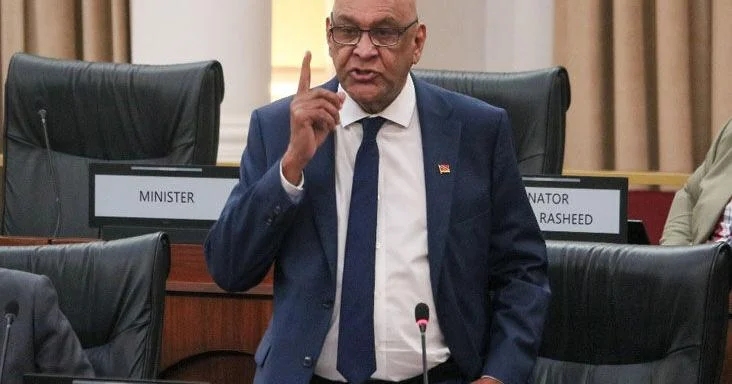By Ria Taitt
A fraud was committed on the people of Trinidad and Tobago regarding Petrotrin, Trade Minister Satyakama Maharaj said yesterday.
Speaking in the debate on the mid-year review in the Senate, at the Red House, Port of Spain, Maharaj said the People’s National Movement (PNM) government told the country Petrotrin was haemor-rha-ging losses, but the accounts showed otherwise.
He said he reviewed the 2018 accounts which showed that in 2017, Petrotrin gene-rated $2.5 billion in net cash from operating activities, of which $500 million was used for investment and $1.8 billion for financing, leaving a cash surplus.
In 2018, the year the decision was made to shut it down, Petrotrin was still generating $2 billion in positive cash flows, he said.
“Approximately $600 million was reinvested, and $1.7 billion was used to meet financial obligations. There was no imminent solvency. The company was still generating foreign exchange and meeting its debts. Despite this, a decision was made, against the advice of consul-tants and without any restructuring plan, to shut down a critical national enterprise,” Maharaj said.
“The result, a staggering econo-mic blow and the destruction of one of our most strategic national assets. Let me be clear. The story that was told to the population was not one of financial necessity. It was one of political expediency. A fraud in the purest economic sense was committed on the people of Trinidad and Tobago, and we are still paying the price today,” Maharaj said.
He said he met the Ministry of Trade in a mess and that all econo-mic indicators are spiralling downward.
“I am not here for theatre…I’m here to tell you what the reality is.
We can either continue heading upward or in a downward direction, becoming a nation of traders and a failed state, or we can change course and steer our country towards First World status,” he said.
“In five years’ time, I envision that people will have to get visas to come here. That’s our plan,” he added.
Barriers to business
Maharaj said he was concerned about the fragmentation of the private sector, siloed, splintered and lacking unified representation.
Their collective potential has been diminished, and neither the previous administration nor parts of the private sector, it seems, have recognised the economic cost of this division, he said.
“In many cases, businesses and investors are not seen as partners in nation building but are treated as burdens, or worse as barriers. This is not just inefficient, it is unaccep-table. And it’s precisely what this administration intends to change,” he said.
He said Lever Brothers, a long–standing foreign direct investor and manufacturer, was neglected for years.
“Nobody worked with them. Rather than being supported and engaged, they were ignored to the point that they shut down their manufacturing operations entirely, and they are not alone,” Maharaj said.
ArcelorMittal, one of the largest non-energy manufacturers and exporters in Trinidad and Tobago, a major foreign exchange earner, was driven out of his country, not by market forces but by government indifference, he said.
“The previous administration outright refused to meet with them to address their concerns. As a result, we lost hundreds of jobs, millions in annual foreign exchange earnings, and one of the most signi-ficant contributors to a non-energy economy. Let us be clear. This was not just an economic loss. It was a self-inflicted wound,” Maharaj said.
“Mr President, coming from the private sector, and I have been in business for about four decades, I was shocked to see the lethargy. In tourism, for instance, we were told that pre-Covid, we had 2,000 yachts visiting our shores. Today, we have 300. And when we asked why, (I get) a shoulder shrug and we get no answer, that is what we inherited.
“We have met with one potential investor, who could make a giant step towards diversifying the economy, who reported to us that for three years, no one would meet with them.
“They’ve been trying to get a meeting. A simple meeting. This is what we have been facing, but rest assured, we will fix it. We have another investor who has been here for decades, I wouldn’t call their name, hiring hundreds of workers, paying taxes, earning foreign exchange.
“Yet, you put a policy in place where you increase the fees that these people are paying for decades by ten times, rendering their business unsustainable. We had to step in,” Maharaj said.
“This is what we found. The fish rots from the head. Investors are not beating their doors to do business here. If we cannot create the right investment climate, they will take their business elsewhere.
“We actually have one of our local companies so frustrated that they have opened two plants in another country that welcomed them with open arms.”
Maharaj said he was spearheading a strategy to bring all the private sector organisations in a unified way, so that they can approach the ministry with one voice.
“That is going to be the most transformational development in the history of business in Trinidad,” he said.
‘Cultural reset’
Maharaj said after oil and gas, the next biggest thing in this country was Carnival.
“I cannot reveal it as yet. It’s still in the formative stages, but we have a project that is going to be as transformational as the development of the Point Lisas Industrial Estate. When I introduce that, we would have transformed this economy beyond oil and gas, tourism, investment and trade,” he said.
Maharaj said the Government wanted to do a “cultural reset” across the wider public sector that sends a clear signal that Trinidad and Tobago is open for business.
“Business and investments are not burdens. They are the engines of prosperity. And we are sending a clear signal. Trinidad and Tobago, it’s open for business, serious business,” he said.
